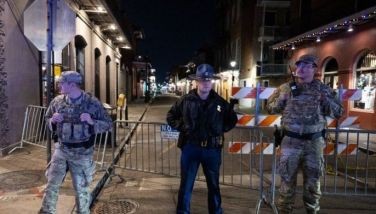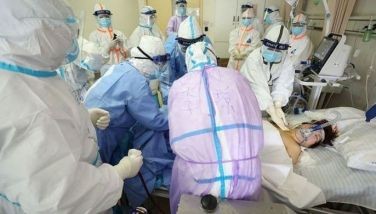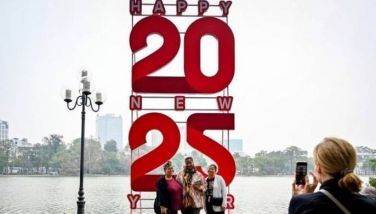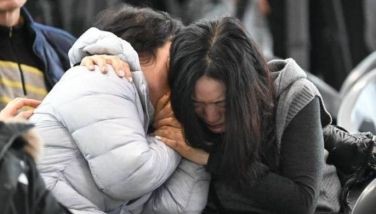Students call for Nobel winner Yunus to lead Bangladesh after Hasina flees
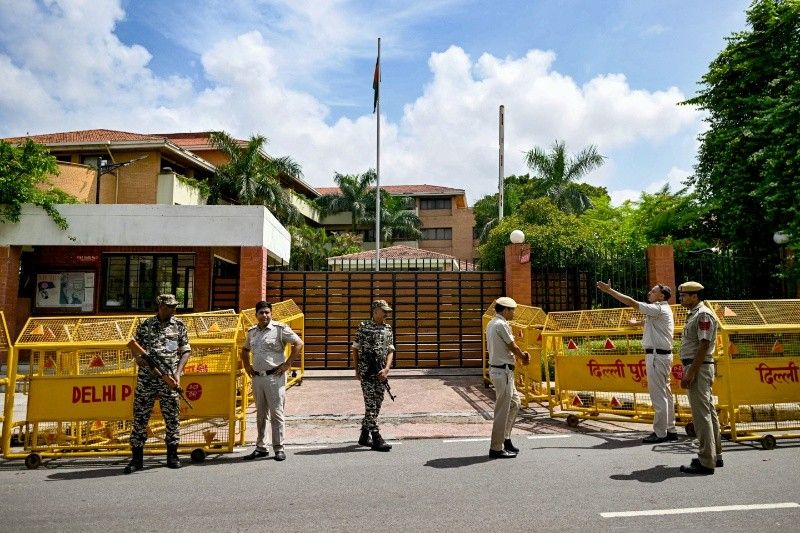
DHAKA, Bangladesh — Student leaders in Bangladesh on Tuesday demanded Nobel winner Muhammad Yunus lead a caretaker government, a day after the military took control as mass demonstrations forced longtime ruler Sheikh Hasina to flee the country.
Hasina, 76, had been in power since 2009 but was accused of rigging elections in January and then watched millions of people take to the streets over the past month demanding she quit.
Hundreds of people died as security forces sought to quell the unrest, but the protests grew and Hasina finally fled Bangladesh aboard a helicopter on Monday as the military turned against her.
Army chief General Waker-Uz-Zaman announced Monday afternoon on state television that Hasina had resigned and the military would form an interim government.
"The country has suffered a lot, the economy has been hit, many people have been killed -- it is time to stop the violence," said Waker, shortly after jubilant crowds stormed and looted Hasina's official residence.
Waker was expected to meet student leaders on Tuesday, to hear their demand for the 84-year-old microfinance pioneer Yunus to lead the government.
'In Dr. Yunus we trust'
The students also want the dissolution of parliament, a call echoed by the key opposition Bangladesh Nationalist Party (BNP), who have demanded elections within three months.
"In Dr. Yunus, we trust," Asif Mahmud, a key leader of the Students Against Discrimination (SAD) group, wrote on Facebook.
Yunus has not commented on the call, but in an interview with India's The Print, he said Bangladesh had been "an occupied country" under Hasina.
"Today all the people of Bangladesh feel liberated," it quoted Yunus as saying.
Streets in Dhaka were largely peaceful on Tuesday -- with traffic resuming and shops opening, but government offices mainly closed -- after a day of chaotic violence saw at least 113 people killed.
Millions of Bangladeshis flooded the streets of Dhaka to celebrate after Waker's announcement on Monday.
"I feel so happy," said Sazid Ahnaf, 21, comparing the events to the independence war that split the nation from Pakistan more than five decades ago.
"We have been freed from a dictatorship."
Deadliest day
But there were also scenes of chaos and anger, with police reporting mobs launching revenge attacks on Hasina's allies.
It was the deadliest day since protests began in early July, with at least 413 people killed overall, according to an AFP tally based on police, government officials and doctors at hospitals.
Protesters stormed parliament and torched TV stations, while some smashed statues of Hasina's father, Sheikh Mujibur Rahman, the country's independence hero.
Others set a museum dedicated to the former leader on fire, flames licking at portraits in destruction barely thinkable just hours before when Hasina still had the loyalty of the security forces in her autocratic grip.
Offices of Hasina's Awami League across the country were torched and looted, eyewitnesses told AFP.
Some businesses and homes owned by Hindus -- a group seen by some in the Muslim-majority nation as having been close to Hasina -- were also attacked, witnesses said.
Political prisoners freed
The unrest began last month in the form of protests against civil service job quotas and then escalated into wider calls for Hasina to stand down.
Her government was accused by rights groups of misusing state institutions to entrench its hold on power and stamp out dissent, including through the extrajudicial killing of opposition activists.
The army chief met President Mohammed Shahabuddin late Monday, alongside key opposition leaders, with the president's press team saying it had been "decided to form an interim government immediately".
Shahabuddin also ordered the release of prisoners from the protests, as well as former prime minister and key opposition leader Khaleda Zia, 78.
Zia, who is in poor health, was jailed by her arch-rival Hasina for graft in 2018.
Mothers of some of the hundreds of political prisoners secretly jailed under Hasina's rule waited outside a military intelligence force building in Dhaka on Tuesday, hoping for news.
"We need answers," said Sanjida Islam Tulee, a coordinator of Mayer Daak, meaning "The Call of the Mothers", a group campaigning for the release of people detained by Hasina's security forces.
Hasina's fate is also uncertain. She fled the country by helicopter, a source close to the ousted leader told AFP.
Media in neighbouring India reported Hasina had landed at a military airbase near New Delhi.
A top-level source said she wanted to "transit" on to London, but calls by the British government for a UN-led investigation into "unprecedented levels of violence" put that into doubt.
Bangladesh has a long history of coups.
The military declared an emergency in January 2007 after widespread political unrest and installed a military-backed caretaker government for two years.
Michael Kugelman, director of the South Asia Institute at the Washington-based Wilson Center, warned that Hasina's departure "would leave a major vacuum" and that the country was in "uncharted territory".
"The coming days are critical," he said.
- Latest
- Trending















